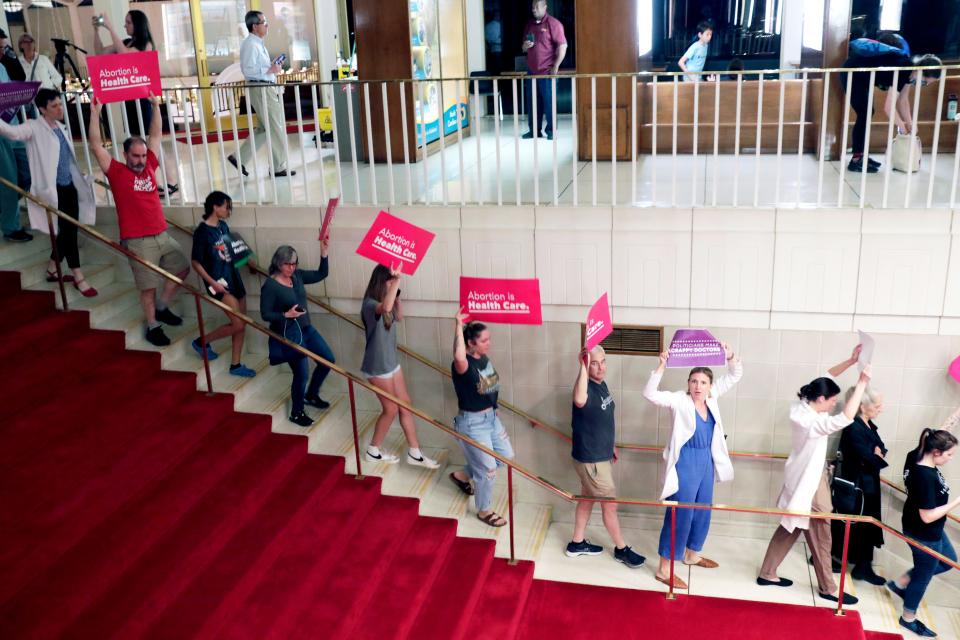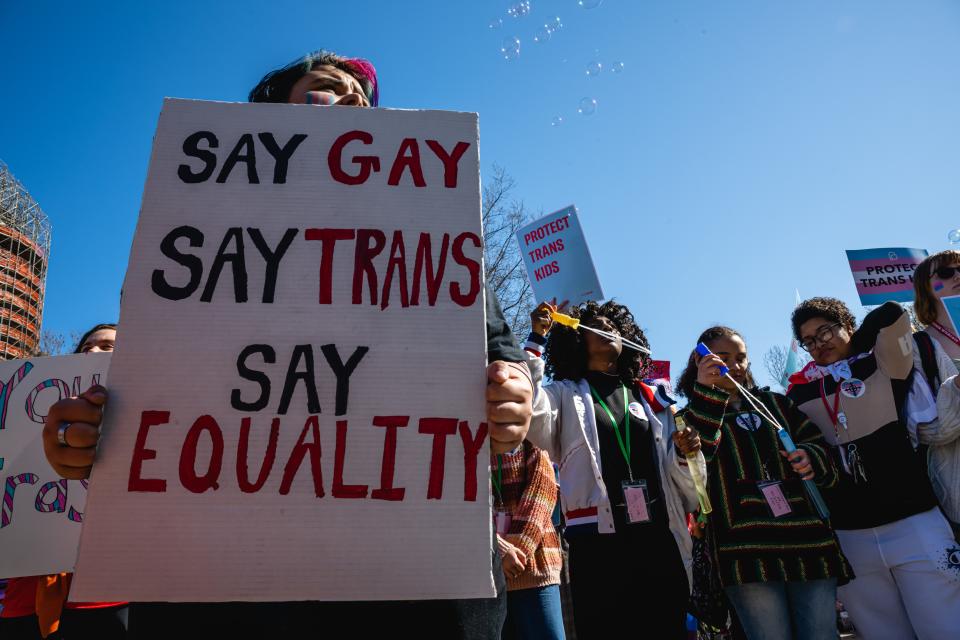As Congress freezes, states take action on abortion rights, marijuana legalization and other top priorities
If federal leaders are asleep at the wheel this fall, state governments look like they're in the driver’s seat hitting the accelerator.
The U.S. House of Representatives ousted former Speaker Kevin McCarthy, R-Calif., last month. Following the historic move, House Republicans took weeks and rounds of voting to find their replacement in now-Speaker Mike Johnson, R-La.
Amidst the infighting, lawmakers have made little progress on funding the government ahead of a Nov. 17 deadline to avoid a potential shutdown.
Meanwhile, local and state officials have taken the lead with legislation on the issues voters are paying attention to in upcoming races, including gun violence, abortion and education debates.
“Most of the legislation that you see is at the state and local level. In Congress, you have one or two things that pass every two years, whereas most of the consistent stuff is at the state level,” said Abhi Rahman, communications director for the Democratic Legislative Campaign Committee.
Because of that difference, Democrats and Republicans alike are paying extra attention to Tuesday's down-ballot elections.
“If you want to really affect policy change, you have to be able to win elections where the most policy gets done,” Rahman said.
Here are some of the issues where voters are looking to their state and local governments, instead of national officials, to make change:

Protecting abortion rights
Since the Supreme Court overturned Roe v. Wade, the 1973 ruling that made abortion legal nationwide, President Joe Biden has called on congressional lawmakers to protect abortion rights. But he has also acknowledged there isn't enough support in Congress to make the move.
That’s why activists are pushing for abortion rights to be enshrined on the state level, particularly in states where strict bans now exist.
Multiple national polls show that support for abortion rights has increased since the Supreme Court blocked Roe v. Wade. And so far, voters in six states – California, Michigan, Vermont, Kansas, Kentucky and Montana – have either passed measures to protect abortion access or rejected efforts to restrict it.
This week, the eyes of the nation turned to Ohio, where voters considered a ballot measure known as Issue 1 to enshrine abortion rights in the state's constitution through viability, typically around 24 weeks gestation.
Next year, voters in Maryland and New York will vote on amendments to their state constitutions that could strengthen access to abortion. And advocates from Arizona to Florida are also pushing to put similar measures on their ballots, eyeing Ohio as a blueprint.
But ballot measures aren’t the only factor driving the national abortion debate. State candidates have also centered their campaigns around the issue.
For example. in Virginia, Republican officials support Gov. Glenn Youngkin’s proposal for a 15-week abortion ban, with exceptions for rape, incest and severe medical emergencies, while Democrats have rallied against it.
In Kentucky, Democratic Gov. Andy Beshear and his opponent, Republican Daniel Cameron, have clashed over exceptions to abortion bans against the backdrop of the state’s law. In the Bluegrass State, officials have completely banned the procedure, except in cases where a pregnant person’s health is at risk.

States pass slew of education bills, while Congress stalls
Education became a high-profile campaign issue after COVID-19 pandemic-related school closures and curriculum “culture wars.”
Republicans in particular have capitalized on the issue, making it a cornerstone campaign message.
Florida Gov. Ron DeSantis, who is also running for the Republican presidential nomination, signed his state's Parental Rights in Education Act into law last year. Florida officials later expanded the act, dubbed “Don’t Say Gay” by critics, to bar instruction of gender identity or sexual orientation in grades K-12.
A handful of copycats have since passed elsewhere, including in Ohio and Alabama. Nearly half of all states introduced some version of so-called "parents’ rights" legislation this year alone, according to the Georgetown University think tank FutureEd.
Voters in Virginia have signaled they’re thinking about education as they head to the polls this year. The state has been a hotbed for the issue since Youngkin capitalized on parents’ frustration during his successful 2021 gubernatorial campaign.
At the federal level, the Republican-led House tried to pass their own parental rights in education law earlier this year. The bill promised to give parents across the country full insight into schools’ curriculum, spending and any violent activities on campus.
But the same criticism the laws have faced at the local level has emerged in Congress. Critics accuse the legislation of being a guise for racist or homophobic beliefs, designed to limit which perspectives or versions of history are taught in classrooms.
After passing the lower chamber in a party-line vote, the parents’ bill of rights has been stuck on the Senate side, where the legislation faces an uphill battle against a Democratic majority.

COVID-19, marijuana and other issues drive voters to the polls
Other issues driving voters to the polls include COVID-19, the legalization of marijuana, voting procedures and slavery.
Voters weighed in on two ballot measures in Arizona and California centered around COVID-19-related regulations. The Arizona amendment was focused on limiting emergency powers for the state's governor, while the California amendment is designed to create a state Pandemic Early Detection and Prevention Institute.
Questions around the use and sale of marijuana − which has long appeared on ballots − are making another round in this year and next year’s elections.
This week, voters in Ohio weighed in on whether to legalize the recreational or personal use of marijuana in the Buckeye State. Several states, including Nebraska, South Dakota and Florida, are taking steps to include similar measures on the ballot next year.
Since the 2020 presidential election, voting policies have also spurred nationwide interest. Ranked choice voting, in which voters rank candidates by preference on ballots, and candidates with a majority of the votes win, will be up for debate in 2024 in both Oregon and Nevada.
And anti-slavery measures will also play a role in future elections. Though Congress ratified the 13th Amendment to the Constitution and abolished slavery in 1865, it is still legal in some states to work without pay as "a punishment for crime" because of a loophole clause.
Last year, measures to eliminate the exception appeared in five states, and four of them approved it. Next year in Nevada, voters will decide whether to remove slavery as a punishment for a crime from their constitution.
This article originally appeared on USA TODAY: Abortion rights, marijuana: States take action as Congress freezes

